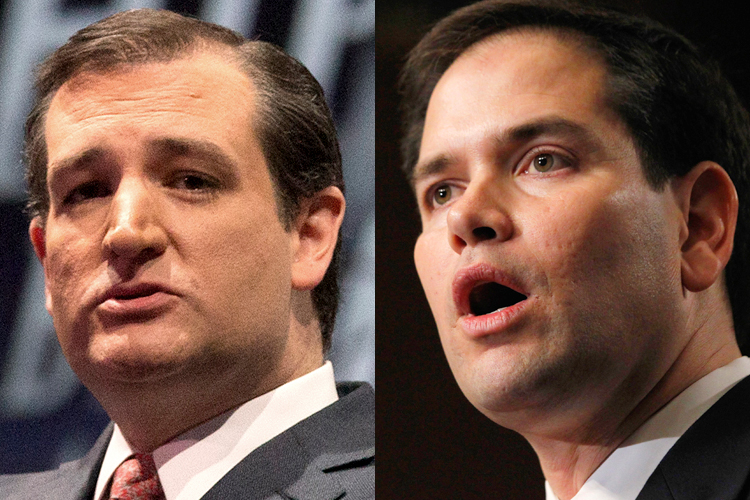Not only did Richard Burr (R-NC), Chairman of the Senate Intelligence Committee, just give ISIS and all our other adversaries important information about our intelligence programs, but in the process he proved that secrecy has become no more than a tool for policing dissent.
At issue are a series of claims that Marco Rubio and Ted Cruz have made in recent days about the old and new phone records programs used to identify potential terrorist sympathizers in the U.S. The two candidates are fighting over whether the old Section 215 phone dragnet, which aspired to collect all the phone records of all Americans or a replacement program introduced by the USA Freedom Act better protected the United States against terrorism.
Rubio started the fracas, on Friday, when he revealed on Fox News that a large number of companies aren’t retaining call detail records that would be available for queries under the new program instituted by the USA Freedom Act. “There are large and significant number of companies that either said, we are not going to collect records at all, we’re not going to have any records if you come asking for them,” Rubio explained, “or we’re only going to keep them on average of 18 months.”
Since the initial Edward Snowden leak, the government has considered not only what phone companies participated in the Section 215 phone dragnet but even how many participate to be highly secret information. They’ve gone so far as to invoke state secrets to hide such information.
That hasn’t changed with the passage of USA Freedom Act. Indeed, the bill was written so ambiguously with regards to the scope of the new call records program that a number of activists who had supported the bill only began to learn of its scope in the wake of Rubio’s leak that “a large number of companies” might get records requests under the bill. Rubio effectively alerted adversaries that the program now goes well beyond the Verizon, AT&T, and Sprint records included under the old program.
Rubio added key information on Sunday, when he revealed on “Meet the Press” that some of the “phone companies” under the program will only hold call records for “six months.” This detail made it clear the “large number of companies” getting call record requests were not subject to a Federal Communications Commission’s mandate that “phone companies” — that is, traditional telephony carriers — keep records at least 18 months. Indeed, the six month period is less than cell providers have indicated they keep records, providing yet another clue that the USAF program extends beyond what most people think of as “phone companies.”
Importantly, Rubio obtained this information while serving on the Senate Intelligence Committee. As someone read into these programs, he has a heightened duty to keep this information secret — a duty he ignored in the rush to make false claims about intelligence.
Curiously, Senator Richard Burr, a surveillance maximalist like Rubio, showed no concern that Rubio had twice gone on cable TV and leaked classified information.
It wasn’t until Ted Cruz tried to rebut some other false claims Rubio has made about USAF that Burr got concerned. In Tuesday night’s debate, Cruz said that the old Section 215 dragnet “covered 20 percent to 30 percent of phone numbers” — a detail first reported by four major newspapers in early 2014 — whereas “the new program covers nearly 100 percent.” Cruz explained how that could be the case: “The prior program only covered a relatively narrow slice of phone calls … primarily land lines.” But the new program includes a number of different kinds of “phones.”
“Now we have cell phones, now we have Internet phones, now we have the phones that terrorists are likely to use and the focus of law enforcement is on targeting the bad guys,” Cruz said.
After Cruz’s invocation of percentages, Rubio immediately tagged the information as classified. “Let me be very careful when answering this, because I don’t think national television in front of 15 million people is the place to discuss classified information.”
And all of a sudden yesterday morning, after having ignored Rubio’s earlier leaks, Burr showed a concern about leaks of classified information about the new phone records program. He told reporters he was having his staff review whether Cruz — not Rubio — leaked classified information, even while admitting that Cruz hadn’t gotten an official briefing on that figure.
In doing so, of course, he also called attention to and confirmed Cruz’ comments, just in case the terrorists targeted by the program weren’t following closely.
Burr confirmed something else with his newfound concern about leaks. The Senate Intelligence Committee Chair showed no concern when an ally, someone actually privy to ongoing details about this program, leaked information about the new phone records program. He only got concerned — and in the process confirmed classified information — when someone who disagrees with his support for unlimited dragnets starting rebutting Rubio’s false claims.
Effectively, then, Burr is using rules about classification not to protect sources and methods — he and his colleague on the Senate Intelligence Committee have already blown that — but to silence dissent. Burr is trying to use this investigation into Cruz to ensure that no one can call out clear lies Rubio is telling about the surveillance programs he purportedly oversees.

